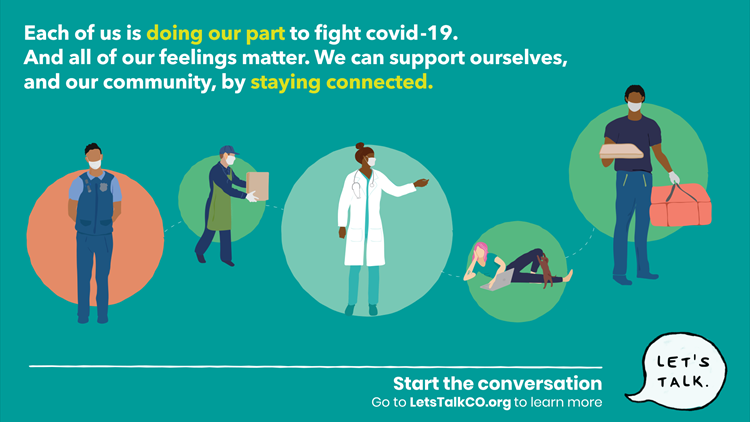COLORADO, USA — PAID CONTENT PROVIDED BY LET'S TALK COLORADO
As Medical Officer for Boulder, Broomfield and Pueblo Counties, Dr. Chris Urbina knew the strict guidelines he recommended to long-term care facilities, including prohibiting all visits from family members, were necessary to limit the spread of the novel coronavirus.
As a son, he didn’t comprehend how painful those restrictions could be until his father was exposed to, and later diagnosed with, COVID-19.
Urbina’s frequent, in-person visits were replaced by conversations through his father’s closed window, then (after giving his father a few tutorials through the glass) FaceTime calls. One morning Urbina’s father called to say he couldn’t breathe.
Arthur Urbina, 92, spent 11 days in the hospital and eventually recovered, but it was a fearful and painful time for Chris, his two brothers, and their families.
“He could barely communicate over the phone, and for us it became worse and worse,” he said. “It was like we were preparing to say goodbye to him from far away.”
Many Coloradans have had similar experiences since the pandemic struck. Unable to be present to support ailing relatives, or to grieve with their family and friends when a loved one dies. Many struggle to find ways to cope with their grief, sadness and loss.
Licensed Marriage and Family Therapist Kendra Doukas, assistant director of the Catalyst Center in Cherry Creek, has seen a spike in clients whose guilt and loss is compounded by the need to maintain physical distance.
“There’s an injustice to all of this,” Doukas said. “(Clients) say ‘it’s just wrong that I can’t be there when they’re in pain or dying.’”
Like Urbina, Doukas speaks from experience. She recently lost an aunt, and mourners were only able to “attend” the funeral by watching a livestream of the services on YouTube. As with her clients, she found the experience to be awkward and not emotionally fulfilling, but for many it’s the best solution available.
Doukas recommends her clients find creative ways to maintain personal connection despite physical distancing guidelines, whether they’re grieving a loss, stressed about the pandemic, or frustrated because they can’t be there for those they love. Some utilize virtual conferencing, others prefer texting, writing letters or phone calls. After her aunt’s passing, Doukas’ father started an email thread to allow family members and friends to share their memories and feelings of loss.
Urbina and Doukas both emphasize that expressing what we’re going through with someone we trust— a friend, family member, neighbor or coworker— is immensely beneficial to our mental health, whatever method we choose to do so.
“Too often we think our pain is a scar we need to bear alone, but it does get better when we talk about it,” Doukas said.
Urbina said talking openly with his brothers about their fear, anger and worries was what got them through the harrowing time when their father was in the hospital.
“When we take that first step and talk about it, we immediately feel better.”
Urbina also recommends visiting the Let’s Talk Colorado website. The website, available in English and Spanish, has suggestions to help Coloradans open up about their own stress, sadness and other feelings, he said. There are also effective ways to support others who may be grieving or struggling, and contact information for mental health resources, some of which are available free of charge.
Whether we write a letter, send a text, conference, FaceTime or call someone, Doukas and Urbina agree the most important thing is just to start the conversation.
“We need each other in times of crisis,” Urbina said. “Just because we’re six feet away doesn’t mean we can’t talk to each other.”
THIS ARTICLE INVOLVES COMMERCIAL CONTENT. THE PRODUCTS AND SERVICES FEATURED APPEAR AS PAID ADVERTISING. FOR MORE INFORMATION, EMAIL US.
COLORADO & COMPANY IS A PART OF 9NEWS AND FEATURES COLORADO EVENTS, COMPANIES, BUSINESS PEOPLE AND OTHER OTHER GUESTS FROM AROUND THE COUNTRY.



